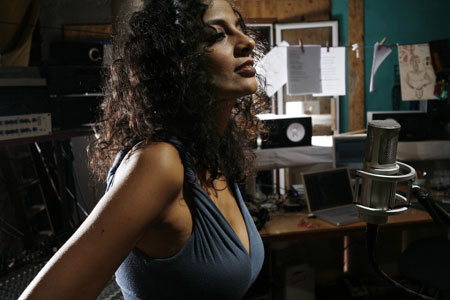Born in Mogadishu (Somalia) to an Italian father and Ethiopian mother, Saba has come to represent the meeting of African and European cultures: as an actress she starred in a long-running TV drama, playing the role of a policewoman fighting against the prejudice of her colleagues, while dealing with issues such as illegal immigration from Africa.
On Jidka (The Line), her musical debut, she explores the divide between Somalia and Italy with a rare sensitivity and gentle humor; mixing acoustic guitars and koras with traditional African beats and contemporary percussion. The result reflects both one woman’s search for her identity and what it means to be alive in the 21st century, when so many people live in more than one culture.
Saba left Somalia when she was 5 years old. As the product of a mixed marriage and because her father was Italian (Italy being the colonial ruler of Somalia), the family was viewed with some suspicion. They were given 48 hours to leave, forcing them to migrate to Italy. From this point on Saba was determined to hold on to her Somali roots, to learn the language and to mend the broken thread with her homeland through music.
Jidka is Saba’s way of telling her story. The word ‘Jidka’, which is the title track, means line – the line that runs on her belly and divides it into two parts – a darker side and a lighter one. This for her represents the union of diversities and the harmony that her parents found when they fell in love. Her story focuses on her identity as multilayered and with many influences. She sings in her mother tongue – a type of Somali that is spoken in Reer Xamar, a quarter of Mogadishu, and has real expression and rhythm in itself. The result is an album which is a real mix of contemporary and traditional.
Many of the songs on the album describe the struggles of life in Somalia. ‘I Sogni’ is the story of a woman who leaves her village for the big city in search of a better life; ‘Melissa’, sung partly in English, is about the plight of many women who escaped the civil war and crossed the desert in search of freedom. ‘Je Suis Petite’ is dedicated to Africa – a continent full of suffering (‘The world is cruel, and I am so little’). Other songs are more romantic, describing love and the importance of living in the moment (‘Manta’). ‘Hanfarkaan’ describes how the wind is linked to the spirit – when it blows strongly, it brings us into contact with the spirit of someone we have lost.
Saba is joined on jembe, guitar and percussion by long-term friend and collaborator, Tatè Nsongan, from Cameroon, on kora Senegalese Lao Kouyatè and on vocals Felix Moungara. The album is produced by well-known musician/ composer Fabio Barovero, founder of Mau Mau and the Banda Ionica project. As Saba says, ‘we worked to realize a sound which combines past and present, tradition and modernity, with our minds open to a future of increasing cultural mixes.’
(headline image: Saba – Photo by Alex Majoli)
Discography:
Jidka (Riverboat Records, 2007)


